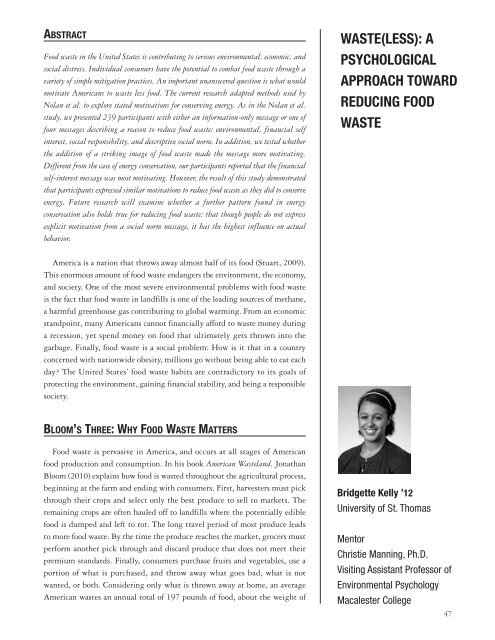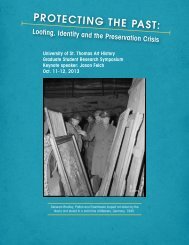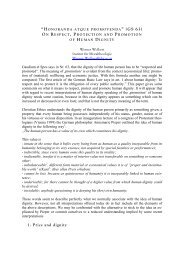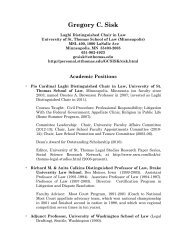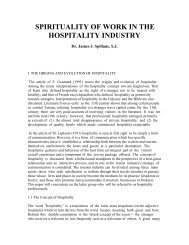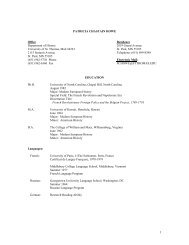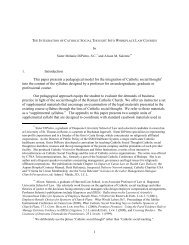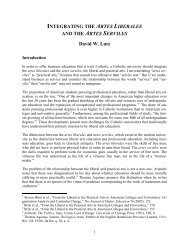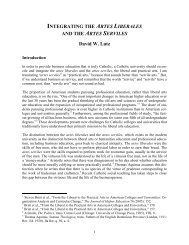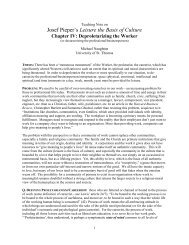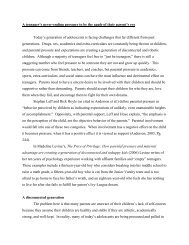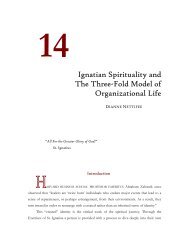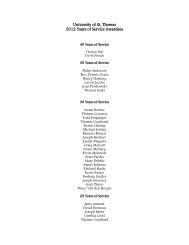dr. ronald e. mcnair acknowledgements - University of St. Thomas
dr. ronald e. mcnair acknowledgements - University of St. Thomas
dr. ronald e. mcnair acknowledgements - University of St. Thomas
You also want an ePaper? Increase the reach of your titles
YUMPU automatically turns print PDFs into web optimized ePapers that Google loves.
ABSTRACT<br />
Food waste in the United <strong>St</strong>ates is contributing to serious environmental, economic, and<br />
social distress. Individual consumers have the potential to combat food waste through a<br />
variety <strong>of</strong> simple mitigation practices. An important unanswered question is what would<br />
motivate Americans to waste less food. The current research adapted methods used by<br />
Nolan et al. to explore stated motivations for conserving energy. As in the Nolan et al.<br />
study, we presented 239 participants with either an information-only message or one <strong>of</strong><br />
four messages describing a reason to reduce food waste: environmental, financial self<br />
interest, social responsibility, and descriptive social norm. In addition, we tested whether<br />
the addition <strong>of</strong> a striking image <strong>of</strong> food waste made the message more motivating.<br />
Different from the case <strong>of</strong> energy conservation, our participants reported that the financial<br />
self-interest message was most motivating. However, the result <strong>of</strong> this study demonstrated<br />
that participants expressed similar motivations to reduce food waste as they did to conserve<br />
energy. Future research will examine whether a further pattern found in energy<br />
conservation also holds true for reducing food waste: that though people do not express<br />
explicit motivation from a social norm message, it has the highest influence on actual<br />
behavior.<br />
America is a nation that throws away almost half <strong>of</strong> its food (<strong>St</strong>uart, 2009).<br />
This enormous amount <strong>of</strong> food waste endangers the environment, the economy,<br />
and society. One <strong>of</strong> the most severe environmental problems with food waste<br />
is the fact that food waste in landfills is one <strong>of</strong> the leading sources <strong>of</strong> methane,<br />
a harmful greenhouse gas contributing to global warming. From an economic<br />
standpoint, many Americans cannot financially afford to waste money during<br />
a recession, yet spend money on food that ultimately gets thrown into the<br />
garbage. Finally, food waste is a social problem: How is it that in a country<br />
concerned with nationwide obesity, millions go without being able to eat each<br />
day? The United <strong>St</strong>ates’ food waste habits are contradictory to its goals <strong>of</strong><br />
protecting the environment, gaining financial stability, and being a responsible<br />
society.<br />
BLOOM’S THREE: WHY FOOD WASTE MATTERS<br />
Food waste is pervasive in America, and occurs at all stages <strong>of</strong> American<br />
food production and consumption. In his book American Wasteland, Jonathan<br />
Bloom (2010) explains how food is wasted throughout the agricultural process,<br />
beginning at the farm and ending with consumers. First, harvesters must pick<br />
through their crops and select only the best produce to sell to markets. The<br />
remaining crops are <strong>of</strong>ten hauled <strong>of</strong>f to landfills where the potentially edible<br />
food is dumped and left to rot. The long travel period <strong>of</strong> most produce leads<br />
to more food waste. By the time the produce reaches the market, grocers must<br />
perform another pick through and discard produce that does not meet their<br />
premium standards. Finally, consumers purchase fruits and vegetables, use a<br />
portion <strong>of</strong> what is purchased, and throw away what goes bad, what is not<br />
wanted, or both. Considering only what is thrown away at home, an average<br />
American wastes an annual total <strong>of</strong> 197 pounds <strong>of</strong> food, about the weight <strong>of</strong><br />
WASTE(LESS): A<br />
PSYCHOLOGICAL<br />
APPROACH TOWARD<br />
REDUCING FOOD<br />
WASTE<br />
Bridgette Kelly ’12<br />
<strong>University</strong> <strong>of</strong> <strong>St</strong>. <strong>Thomas</strong><br />
Mentor<br />
Christie Manning, Ph.D.<br />
Visiting Assistant Pr<strong>of</strong>essor <strong>of</strong><br />
Environmental Psychology<br />
Macalester College<br />
47


